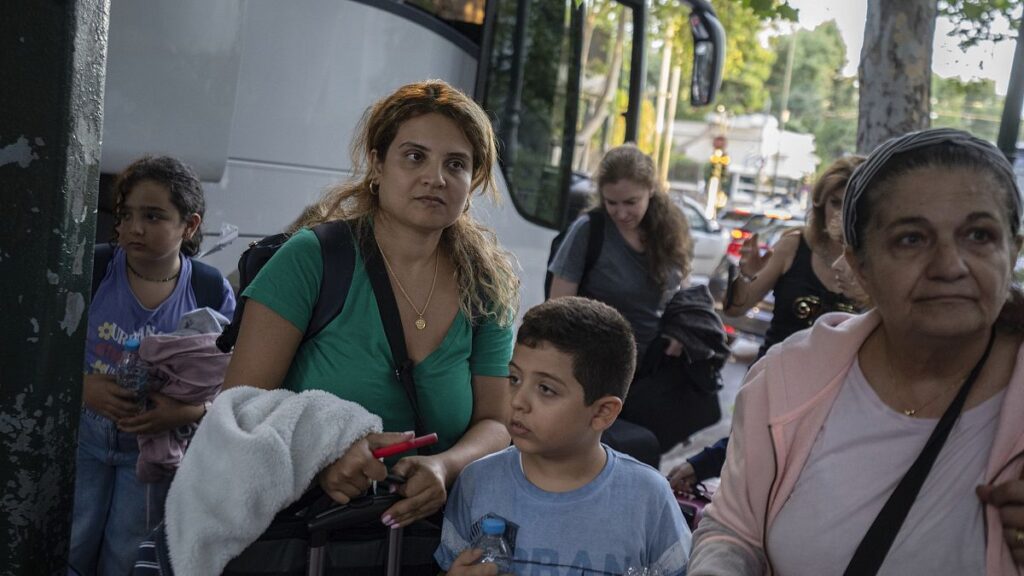These evacuations happened as the Israeli military issued fresh evacuation orders for communities in southern Lebanon, signalling that it may widen the ground operation launched earlier this week against the Hezbollah militant group.
EU countries have continued to evacuate their citizens from Lebanon as hostilities between Israel and Hezbollah escalate and fears of a wider regional war in the Middle East grow.
Germany flew another 130 of its citizens out of the country on board a military plane that landed in Frankfurt late on Wednesday evening.
The foreign and defence ministries said the Airbus A330 belonging to the Multinational Multi Role Tanker Transport Unit – an international air transport fleet – was sent to Beirut to bring back “particularly endangered” Germans.
“It was a risk. So every time we went out on the street, it was a risk. No matter where you went, you thought something was about to happen,” said Samira Salman as she arrived in the airport.
The German Foreign Ministry said in a post on X that the evacuation plane also brought five tonnes of aid, particularly medical equipment, into the Lebanese capital.
Wednesday’s flight comes after a German military plane on Monday flew 111 people from Beirut to Berlin – families of German diplomats, nonessential staff and Germans with medical issues.
Greece also sent a military transport plane to Beirut on Thursday to bring home both Greek and Cypriot nationals who wanted to leave Lebanon.
The C-130, carrying 38 Cypriots and 22 Greeks, landed in Larnaca in Cyprus on Thursday afternoon, before heading to a military airfield near Athens later in the day.
Some who arrived safely in Cyprus spoke of their fear and what they’d witnessed.
“It was quite tough times the last week, especially. It was bombing. We could hear it. It was loud, it was scary. And you know, seeing civilians suffer, regardless. It was very tough times, especially for my kids,” said one of the evacuees, Gigi Halifa.
Greece’s foreign ministry says it has established hotlines for its citizens living in Lebanon to call if they require assistance in leaving the country.
Spain evacuated the first group of its citizens on Thursday, bringing 250 people home on board two military planes which landed at the Torrejón air base east of the capital Madrid.
Many of the evacuees who spoke to Spanish broadcaster TVE at Beirut airport said they only had a handful of belongings with them as they were in such a rush to leave.
“Terrible. Terrible. Nobody can believe it, that can’t be believed, because of the amount of bombs, because of the sound of the planes that doesn’t leave you all night,” said one man.
Spain’s Foreign Ministry said the situation in Lebanon is so serious that part of the embassy staff will be airlifted out of Beirut on a second plane, leaving only a skeleton staff behind to carry out essential diplomatic work.
France has also started evacuating its citizens, with the first group arriving on one of four flights that landed at Charles de Gaulle Airport in Paris.
“I’m happy, I’m reunited with my family. But I’m sad to have left Lebanon. Life there is very hard, especially recently. But now I know I’m safe, I’m with my family,” said one woman as she arrived.
The French embassy in Lebanon has reportedly negotiated two additional flights to Paris with the Lebanese national airline MEA.
Meanwhile, flag carrier Air France says it has suspended all passenger flights to Lebanon until at least 8 October.
And more than 300 Turkish and foreign nationals have arrived in the southern port of Mersin after traveling on a ship that left the Lebanese city of Tripoli.
The IHA news agency said the Med Lines ship was the third to arrive in Mersin in recent days.
The passengers then travelled onwards to their home countries, IHA reported.
“We go to Beirut to work, regularly, for three months at a time. But the bombs started to explode to the left, to the right, right next to our hotel. It’s not like what you see on TV, it’s a bloodbath,” said Turkish evacuee, Baki Cidem.
On Tuesday, the Turkish Foreign Ministry said the security situation in Lebanon was likely to deteriorate and that it had set up an emergency hotline for citizens to submit applications for evacuations.
The statement said a delegation including officials from the Foreign Ministry, the Directorate General of Security and the Presidency of Migration Management had been deployed to Lebanon to oversea transport out of the country.
Evacuation orders
These evacuations all happened as the Israeli military said it had warned people to evacuate a city and other communities in southern Lebanon that are north of a UN-declared buffer zone, signalling that it may widen a ground operation launched earlier this week against the Hezbollah militant group.
Israel has told people to leave Nabatieh, a provincial capital, and other communities north of the Litani River, which formed the northern edge of the border zone established by the UN Security Council following the 2006 war.
Read the full article here

